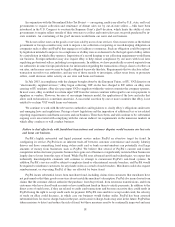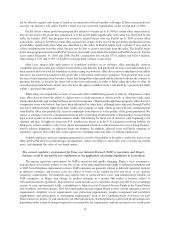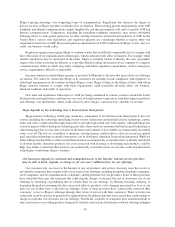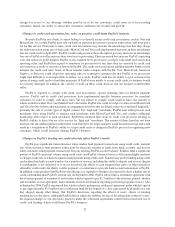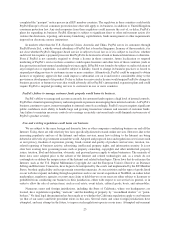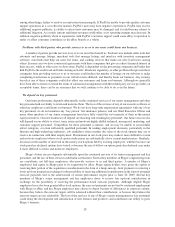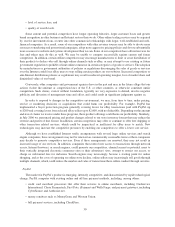eBay 2006 Annual Report Download - page 27
Download and view the complete annual report
Please find page 27 of the 2006 eBay annual report below. You can navigate through the pages in the report by either clicking on the pages listed below, or by using the keyword search tool below to find specific information within the annual report.completed the “passport” notice process in all EU member countries. The regulators in these countries could notify
PayPal (Europe) of local consumer protection laws that will apply to its business, in addition to United Kingdom
consumer protection law. Any such responses from these regulators could increase the cost of, or delay, PayPal’s
plans for expanding its business. PayPal (Europe) is subject to significant fines or other enforcement action if it
violates the disclosure, reporting, anti-money laundering, capitalization, funds management or other requirements
imposed on electronic money institutions.
In markets other than the U.S., European Union, Australia and China, PayPal serves its customers through
PayPal Private Ltd., a wholly-owned subsidiary of PayPal that is based in Singapore. In many of these markets, it is
not clear whether PayPal’s Singapore-based service is subject to local law or, if it is subject to local law, whether
such local law requires a payment processor like PayPal to be licensed as a bank or financial institution or otherwise.
Even if PayPal is not currently required to obtain a license in those countries, future localization or targeted
marketing of PayPal’s service in those countries could require licensure and other laws of those countries (such as
data protection and anti-money laundering laws) may apply. If PayPal were found to be subject to and in violation of
any foreign laws or regulations, it could be subject to liability, forced to change its business practices or forced to
suspend providing services to customers in one or more countries. Alternatively, PayPal could be required to obtain
licenses or regulatory approvals that could impose a substantial cost on it and involve considerable delay to the
provision or development of its product. Delay or failure to receive such a license would require PayPal to change its
business practices or features in ways that would adversely affect PayPal’s international expansion plans and could
require PayPal to suspend providing services to customers in one or more countries.
PayPal’s failure to manage customer funds properly would harm its business.
PayPal’s ability to manage and account accurately for customer funds requires a high level of internal controls.
PayPal has a limited operating history and management experience in managing these internal controls. As PayPal’s
business continues to grow, it must strengthen its internal controls accordingly. PayPal’s success requires significant
public confidence in its ability to handle large and growing transaction volumes and amounts of customer funds.
Any failure to maintain necessary controls or to manage accurately customer funds could diminish customer use of
PayPal’s product severely.
New and existing regulations could harm our business.
We are subject to the same foreign and domestic laws as other companies conducting business on and off the
Internet. Today, there are still relatively few laws specifically directed towards online services. However, due to the
increasing popularity and use of the Internet and online services, many laws relating to the Internet are being
debated at all levels of government around the world. Adopted and proposed laws and regulations cover issues such
as user privacy, freedom of expression, pricing, fraud, content and quality of products and services, taxation, tax-
related reporting of business activity, advertising, intellectual property rights, and information security. It is not
clear how existing laws governing issues such as property ownership, copyrights and other intellectual property
issues, taxation, libel and defamation, obscenity, and personal privacy apply to online businesses. The majority of
these laws were adopted prior to the advent of the Internet and related technologies and, as a result, do not
contemplate or address the unique issues of the Internet and related technologies. Those laws that do reference the
Internet, such as the U.S. Digital Millennium Copyright Act and the European Union’s Directive on Distance
Selling and Electronic Commerce, have begun to be interpreted by the courts and implemented by the EU Member
States, but their applicability and scope remain somewhat uncertain. As our activities and the types of goods listed
on our websites expand, including through acquisitions such as our recent acquisition of StubHub, an online ticket
marketplace, regulatory agencies or courts may claim or hold that we or our users are either subject to licensure or
prohibited from conducting our business in their jurisdiction, either with respect to our services in general, or in
order to allow the sale of certain items, such as real estate, event tickets, cultural goods, boats, and automobiles.
Numerous states and foreign jurisdictions, including the State of California, where our headquarters are
located, have regulations regarding “auctions” and the handling of property by “secondhand dealers” or “pawn-
brokers.” No final legal determination has been made as to whether the California regulations apply to our business
(or that of our users) and little precedent exists in this area. Several states and some foreign jurisdictions have
attempted, and may attempt in the future, to impose such regulations upon us or our users. Attempted enforcement
23







